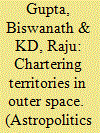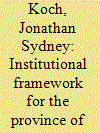|
|
|
Sort Order |
|
|
|
Items / Page
|
|
|
|
|
|
|
| Srl | Item |
| 1 |
ID:
158354


|
|
|
|
|
| Summary/Abstract |
Space research is heralded as the harbinger of the next level of advancement in science and technology. The fact that countries are spending millions of dollars in this regard is testament to its potential. India is making inroads in the field and, in the last 15 years, has established itself as a dominant player. According to Antrix, the commercial wing of the Indian Space Research Organization, India commercially launched 209 foreign satellites of other countries into space. Apart from this, Antrix is applying its success in other commercial activities, like remote sensing, selling of space objects (parts of satellites and launching vehicles), and mission support. In keeping with this development, the Indian legal position and policy framework with respect to commercial space activities are reviewed. The article also surveys India’s commitment to international space law and its reflection in national legislation. Finally, the existing policy related to commercial space in India is examined and measures are suggested to create national legislation for the country to deal with issues of commercial space activities.
|
|
|
|
|
|
|
|
|
|
|
|
|
|
|
|
| 2 |
ID:
158351


|
|
|
|
|
| Summary/Abstract |
This article addresses the current lack of a legal framework for the use of space resources found on asteroids and other celestial bodies. In a world of growing inequality and in face of the increasing commercialization of space, governance structures are needed to ensure that the benefits of the “province of all mankind” are not solely reaped by those industrialized nations that have the technological and financial capabilities. Drawing upon the practical achievements of the International Seabed Authority governing the extraction of natural resources from the seabed in areas beyond national jurisdiction, a discursive policy framework for the equitable development of the global commons of space is proposed. Acknowledging the importance of a multi-disciplinary approach, the normative structure is complemented by the insight gained from stakeholders from across sectors, in a critical effort to unite political, ethical, and commercial considerations.
|
|
|
|
|
|
|
|
|
|
|
|
|
|
|
|
| 3 |
ID:
158353


|
|
|
|
|
| Summary/Abstract |
Geoengineering proposals are increasingly acknowledged as possible responses to climate change because of the repeated failure of national decision makers to solve the collective action problem of allocating carbon emission reductions at the Conference of the Parties to the United Nations Framework Convention on Climate Change. Geoengineering is attractive, the possible moral hazard notwithstanding, because of differences in the economic effects of climate change across countries, which are organized as factions seeking to shift the burden of carbon reductions or to delay response. This article outlines the political economic advantages of a planetary sunshade to reduce the amount of sunlight reaching the Earth. Rather than adopt the more common game theoretic model to describe the relevant international relations, construction of the planetary sunshade is characterized as an auction in which a single spacefaring power completes construction of the megaproject as a global good, comparable to the willingness of the United States to provide the dollar as a global reserve currency, and then determines the average global temperature based upon financial or material contributions from other countries. The willingness to contribute is based upon calculations of preferred average global temperatures.
|
|
|
|
|
|
|
|
|
|
|
|
|
|
|
|
| 4 |
ID:
158352


|
|
|
|
|
| Summary/Abstract |
The services of space-based technology have advanced for monitoring strategies, especially for studying and predicting the physical events in ecosystems. This article investigates the viability of space technology use for monitoring implementations of climate policies and, potentialities for mitigation of climate process drivers. Qualitative data were sourced through Delphi experts’ method and quantitatively analyzed. The key findings show that experts allude to the high (3.33/4) anticipatory contributions of deploying space-based systems with dedicated sensors for monitoring implementation of international climate treaties. However, while there is a very strong yes (84.44 percent) rate on the potentiality of space-based solar power for direct climate change mitigation, the feasibility of deploying such systems in the near-future (2020 to 2025) is low (1.77/4). The statistics further show that the further away the possible start-time (2040 and a 50-year horizon of 2065) for deployment of space-based solar power, the more likely it will be deployed. The article concludes that deploying satellites for monitoring and mitigating global climate change contributes significantly to climate change management efforts. Specifically, the development of space-based solar power if fast-tracked. The article also provides a conceptual framework for climate change management using space technology, which facilitates constructive discussion informing policy direction on the subject.
|
|
|
|
|
|
|
|
|
|
|
|
|
|
|
|
| 5 |
ID:
158355


|
|
|
|
|
| Summary/Abstract |
Since the late 1940s, a tenacious disconnect between popular interest and professional disinterest in unidentified flying objects (UFOs) has typified the controversy surrounding the subject. Numerous high-profile scientists have seen the topic of UFOs as an opportunity to denounce and rectify a popular, yet allegedly misguided, conviction—that some UFOs are physical anomalies indicating the existence of extraterrestrial intelligence—and thus to advance the explanatory authority of science. Rather than constituting rigorous, informed, and effective assessments, however, the ways in which many prominent scientists publicly address the UFO question often exemplify both the problematic “boundary-work” of scientific discourse in this area and, more specifically, the role that logical fallacies can play in the rhetorical construction of scientific authority in public domains. Through a critical discourse analysis, this article argues that ignorance of UFO phenomena is socially and discursively constructed in ways that are conducive to the public faces of individuals and institutions. More broadly, it suggests that the rudimentary standard of science communication attending to the extraterrestrial intelligence (ETI) hypothesis for UFOs inhibits public understanding of science, dissuades academic inquiry within the physical and social sciences, and undermines progressive space policy initiatives.
|
|
|
|
|
|
|
|
|
|
|
|
|
|
|
|
|
|
|
|
|